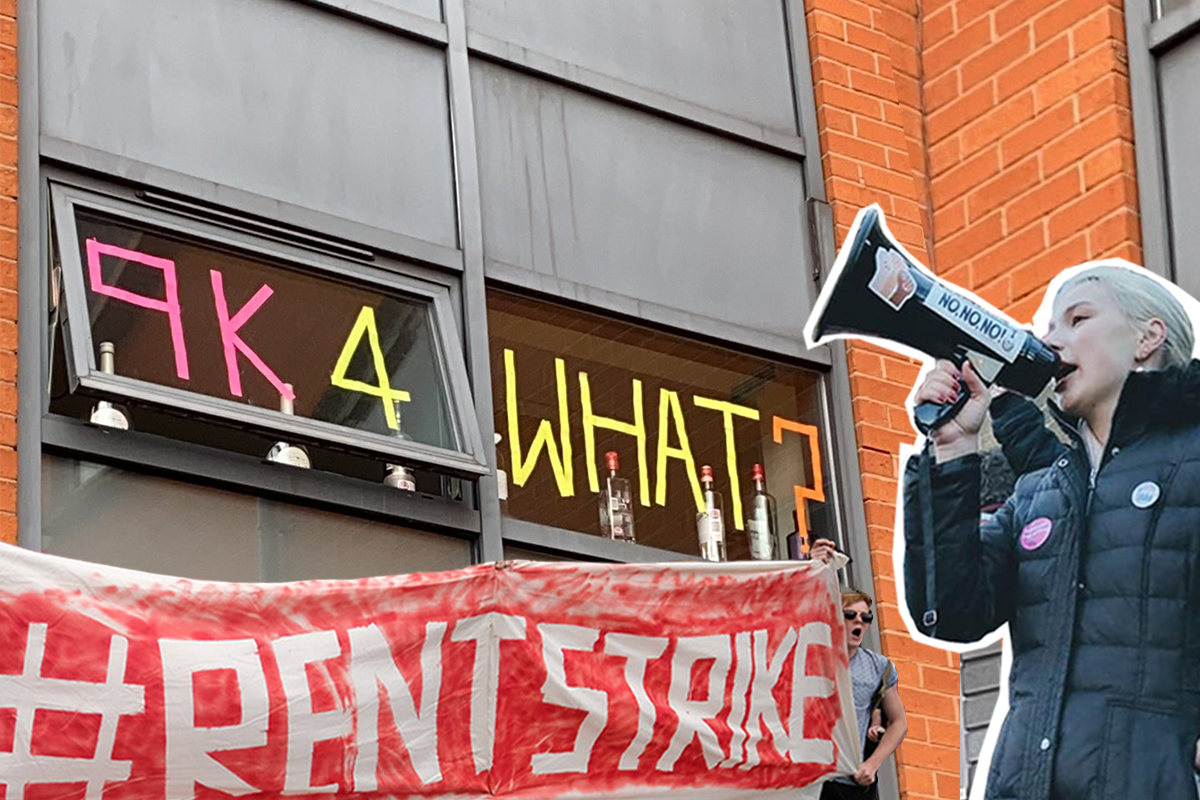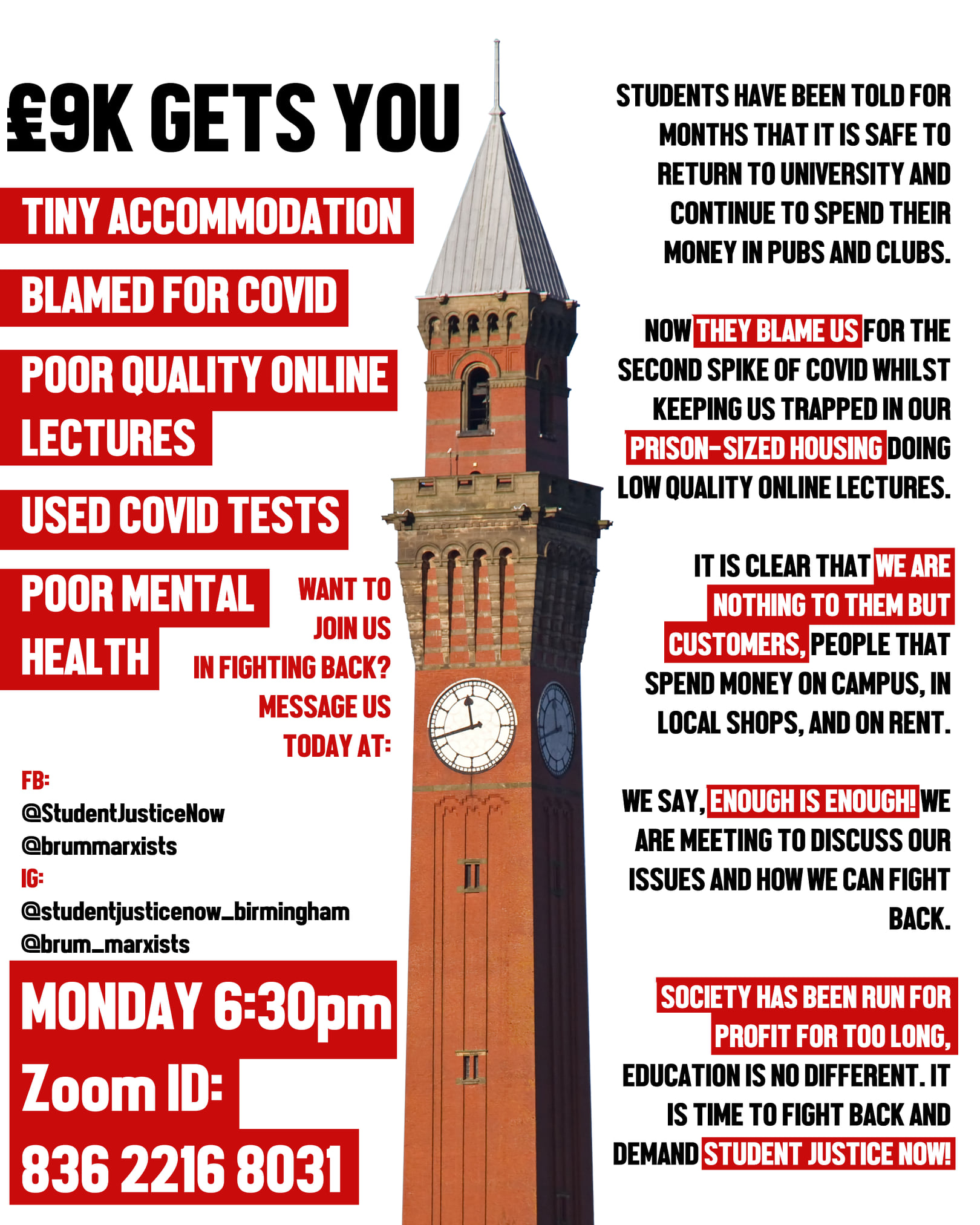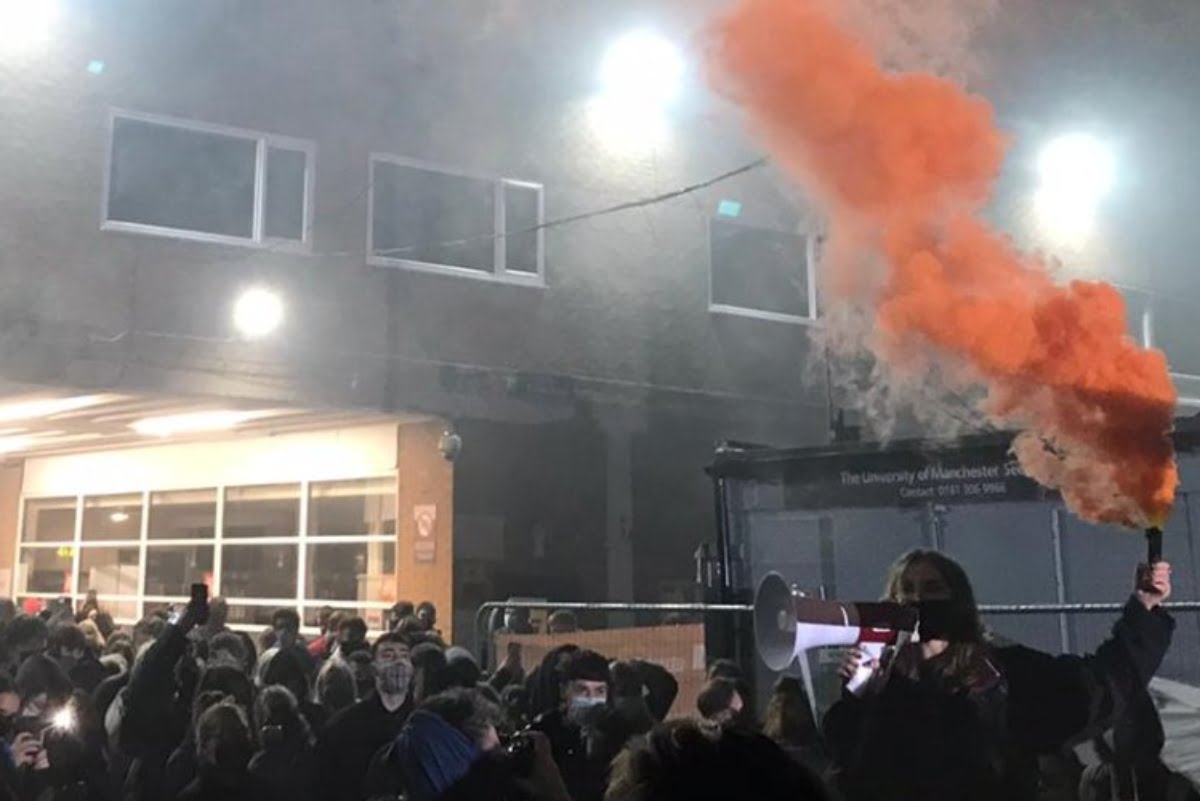The Manchester student rent strike has won concessions from the university, showing what can be achieved through organisation and action. This militant example must now be replicated across the country.
Students at the University of Manchester (UoM) recently scored a victory in their rent strike against the landlords and the university itself. The Manchester students have been striking after being lulled to uni accommodation under false pretenses, where they have been isolated and locked up. Meanwhile, they have had to pay full tuition fees, even though lessons have all been conducted online.
There was the infamous ‘HMP Fallowfield’ incident on 5 November, where students – without any warning – woke up to find fences imprisoning them inside the campus, with no way of getting in or out. On top of this, little-to-no maintenance of these dorms has taken place. There have been numerous floodings from leaked radiators and various malfunctions, all with delayed responses from the university.
This provoked a backlash. Students came together to protest – not just once or twice, but enough that their organising culminated in an occupation of one of the university’s towers. The occupation lasted 14 days, from 12-26 November. From these militant actions, students have gained a victory, receiving a 30% reduction in rent for this term, and a 10% reduction for the rest of the year.
The Manchester students have shown the way forward. We need mass direct action to fight back against the profiteering landlords and university bosses. But a mood of anger exists amongst students for things to go much further.
Education should be free and accessible to all. And that means not only free education, but free accommodation for students, with any necessary costs being covered by a maintenance grant.
To capture this energy and mood, to keep up the momentum of this movement, and to fundamentally transform education everywhere, our movement needs organisation and bold socialist demands.
Next steps
 The next step is for the leadership of the strike to organise grassroots democratic structures. Through this, participants in the strike can formulate demands and strategy, elect accountable representatives, and establish committees to carry out democratic decisions.
The next step is for the leadership of the strike to organise grassroots democratic structures. Through this, participants in the strike can formulate demands and strategy, elect accountable representatives, and establish committees to carry out democratic decisions.
In Manchester, the decision to occupy was taken without consultation, as was the decision to accept the 30% reduction. Look at how much has been achieved through the actions of a small group of activists. Think how much more could be achieved with a mass movement, with the active involvement of the vast majority of students.
We should also not be naive about the behaviour and attitude of university management. 30% is a decent reduction, but it is only for one term. Moreover, what is to stop the university from hiking the rent up again next year?
Given the scale of the crisis in the UK and world economy, next year’s students will be facing even more insecurity and attacks. We must therefore fight to fundamentally change the university system – to make education free and accessible for all, not just for this year, but for all future generations of students.
By establishing permanent grassroots democratic structures for the student movement, we can fight back whenever university bosses attempt to profit from student suffering. These structures can then become a permanent feature from year-to-year.
Ultimately, we should be fighting for students – alongside organised staff and trade unions – to be put in control of running universities, including accommodation costs and the implementation of health and safety measures. It is workers and students who make up the university, not management. We should be the ones deciding how higher education is run.
Marketisation
 The hiking of student rents is linked to the marketisation of higher education, which has been taking place for years. The Tory government is cutting funding to higher education, forcing universities to be run more and more like private businesses.
The hiking of student rents is linked to the marketisation of higher education, which has been taking place for years. The Tory government is cutting funding to higher education, forcing universities to be run more and more like private businesses.
We need to argue for massive public investment in higher education. The Tories claim there’s no money, but that’s not true. Britain’s billionaires have grown richer during the pandemic.
The wealth exists in this country to fund free education for all. The student movement needs to demand and organise for the expropriation of the super-rich, the banks, and big business to achieve this.
Linked to this is the need to strengthen student rent strikes by reaching out to the labour movement on campus, to gain support from organised workers. On that basis, students and staff can form a united struggle against university management; and workers and young people can fight together against the Tories and the crisis-ridden capitalist system.
Marxist societies across the country are actively involved in organising with rent strikers. We demand:
- Free education, including free accommodation and maintenance grants.
- Democratic student committees to manage accommodation, linked up with campus trade unions and staff committees to manage the university.
- Open up the books to see the university’s finances.
- Massive investment in higher education, funded by expropriation.
Below are a few reports of how the Marxist Student Federation has been involved in rent strikes elsewhere.
Birmingham
 In Birmingham, we have been organising the Student Justice Now! campaign – a student based group looking to build enough momentum for a rent strike.
In Birmingham, we have been organising the Student Justice Now! campaign – a student based group looking to build enough momentum for a rent strike.
We started in mid-October, and have established a nucleus of students that will be able to act as the leadership for the growing movement.
The events in Manchester had a palpable effect on the students here. Meetings after the tearing down of the fence had a renewed level of energy, militancy, and a general desire to do something about the horrible treatment of students.
Over the December break we are going to consolidate our forces and produce a small pamphlet featuring reports from Birmingham freshers, lessons of past workers movements, and the need to unite with the labour movement to fight for socialism. We should hopefully be on a strong footing to play a larger role in events come the new year.
Cambridge
So far, the rent strike in Cambridge has been mostly focussed on organising and getting enough support to actually make this a successful endeavour. Every college is organising its own smaller structures, with representatives who are tasked with getting the message around the college and drumming up support on a local level to ensure enough people are ready to strike in January.
Online forms are being filled in by hundreds pledging to strike, with material shared amongst students to help people understand the movement’s aims. There has been one phone-banking session to call those who have signed up, to discuss any questions and solidify support.
Goldsmiths
Goldsmiths students this year have endured terrible treatment from senior management. In response, students are organising a rent strike.
Demands include a 50% reduction in rent for this year; improved responses to maintenance issues; and a response to issues of racism and sexual assaults on campus.
There are over 120 people so far who are interested in taking part in a rent strike, and a committee of students are already organising the strike for the new year.
Goldsmiths Marxists will be on the frontline of this movement. We have already attended meetings discussing the strike, offering bold suggestions for how to fight this struggle as strongly as we can.
Newcastle
Comrades from the Newcastle Marxist society have been organising with #9K4what activists to plan and promote a rent strike. Together we have been visiting university-owned accommodation and leafleting students to attend meetings to discuss demands and strategy for the strike.
Previously, the idea of organising any form of rent strike base has been met with apathy and sometimes outright hostility in Newcastle. This seems to have changed this year, with many students showing interest when approached. For example, we have had already 30 students sign our petition to participate in a rent strike, before it has even been made public.
Our aim is to put forward radical demands at upcoming meetings, and to raise the wider political questions; most importantly, why students are now facing this turmoil. Student struggles do not exist in isolation, but as a product of the crisis of capitalism.






